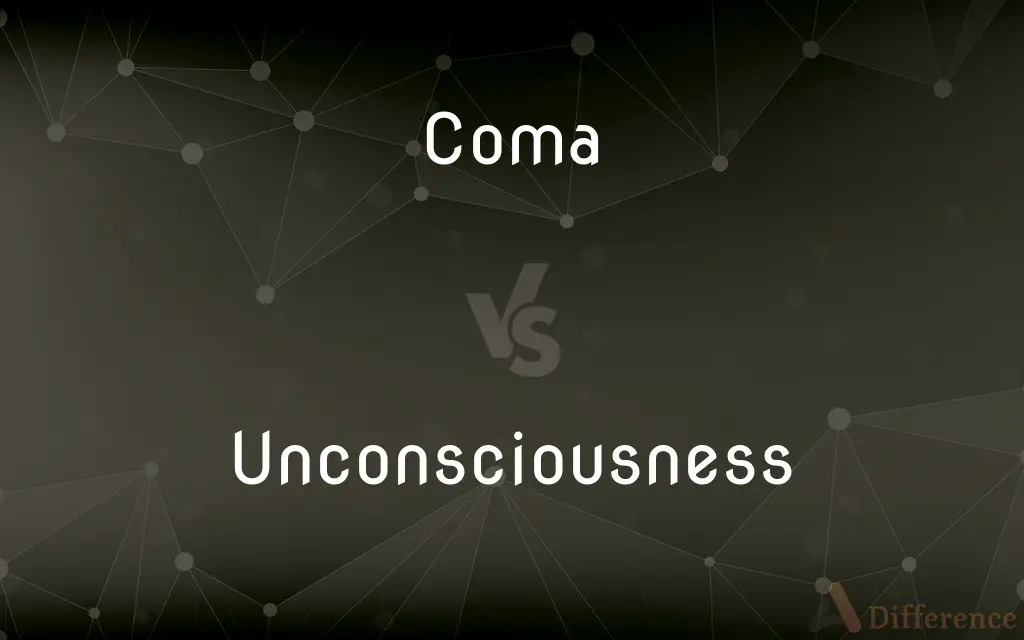Coma vs. Unconsciousness — What's the Difference?
Edited by Tayyaba Rehman — By Maham Liaqat — Updated on March 24, 2024
A coma is a deep state of prolonged unconsciousness where a person cannot be awakened, showing minimal to no response to stimuli, while unconsciousness is a temporary and reversible condition where responsiveness is diminished but can often be restored.

Difference Between Coma and Unconsciousness
Table of Contents
ADVERTISEMENT
Key Differences
A coma represents a severe form of unconsciousness characterized by a sustained period of unresponsiveness and the inability to wake, often resulting from significant brain injury or illness. In contrast, unconsciousness encompasses a broader range of conditions from mild fainting spells to more severe states like coma, but typically, individuals in a general state of unconsciousness retain the potential for quicker and fuller recovery compared to those in a coma.
Comas are medically defined by a lack of both wakefulness and awareness, with patients unable to open their eyes or respond to their environment in a meaningful way. Unconsciousness, however, can vary in depth, with some individuals still able to exhibit reflexive actions or non-purposeful responses to painful stimuli, indicating a lesser degree of brain impairment.
The causes of a coma can be diverse, including traumatic brain injury, stroke, brain tumors, drug or alcohol intoxication, or illnesses affecting the brain. Unconsciousness can be caused by many of the same factors but is also commonly induced by less severe incidents such as head injuries, low blood pressure, dehydration, or a simple fainting episode due to emotional distress.
The prognosis for someone in a coma is more uncertain and often depends on the coma's cause, depth, and duration, as well as the patient's overall health. Recovery from general unconsciousness is usually more promising, with many individuals regaining full awareness and function, especially if the underlying cause is promptly addressed.
Treatment for a coma often involves addressing the underlying cause, maintaining the patient's physical health, and sometimes utilizing medications to reduce brain swelling or seizures. For general unconsciousness, treatment might be as simple as lying the person down with their legs elevated to restore blood flow to the brain, or it might involve more complex interventions similar to those used for coma patients, depending on the cause and severity.
ADVERTISEMENT
Comparison Chart
Definition
Deep, prolonged state of unconsciousness
Temporary and reversible state of reduced responsiveness
Responsiveness
Minimal to none, cannot be awakened
Varied, from minimal to some reflexive responses
Duration
Prolonged, can last for weeks, months, or longer
Typically brief, ranging from seconds to hours
Causes
Severe brain injury, illness, intoxication
Head injuries, fainting, intoxication, medical conditions
Prognosis
Uncertain, dependent on cause and severity
Generally more promising, often fully reversible
Treatment
Address underlying cause, supportive care
Address cause, may range from simple to complex interventions
Brain Function
Significant impairment in wakefulness and awareness
Varying levels of impairment, often less severe
Recovery Potential
Varies widely, can result in long-term impairment
Higher potential for full recovery
Medical Intervention
Often intensive, may include life support
Can be minimal or extensive, depending on cause
Compare with Definitions
Coma
A deep state of unconsciousness where a person is unarousable and unresponsive.
After the car accident, he was in a coma for two months.
Unconsciousness
Can result from a wide range of conditions, from mild to severe.
The sudden drop in blood sugar caused him to lose consciousness.
Coma
Patients show no voluntary actions or awareness of the environment.
Despite loud noises and verbal commands, the patient in a coma showed no response.
Unconsciousness
A state in which a person is not awake and has a reduced response to external stimuli.
She fainted from dehydration, resulting in a brief period of unconsciousness.
Coma
Caused by severe brain injury or significant disturbances in brain function.
The bacterial infection led to encephalitis, resulting in a coma.
Unconsciousness
The duration is generally shorter, with potential for spontaneous recovery.
After a few minutes of unconsciousness, she regained consciousness and was disoriented.
Coma
Assessed by medical scales like the Glasgow Coma Scale for depth and duration.
Her condition was evaluated with the Glasgow Coma Scale to determine the coma's severity.
Unconsciousness
Treatment varies based on the underlying cause and severity.
To treat his unconsciousness, doctors administered glucose to counteract his hypoglycemia.
Coma
Treatment focuses on life support and addressing the root cause.
He was in the ICU, where treatment for his coma included managing brain swelling.
Unconsciousness
Often assessed using the AVPU scale (Alert, Voice, Pain, Unresponsive) to determine responsiveness.
The paramedics assessed her level of consciousness using the AVPU scale.
Coma
A coma is a deep state of prolonged unconsciousness in which a person cannot be awakened, fails to respond normally to painful stimuli, light, or sound, lacks a normal wake-sleep cycle and does not initiate voluntary actions. Coma patients exhibit a complete absence of wakefulness and are unable to consciously feel, speak or move.
Unconsciousness
Unconsciousness is a state which occurs when the ability to maintain an awareness of self and environment is lost. It involves a complete, or near-complete, lack of responsiveness to people and other environmental stimulus.
Coma
A state of deep, often prolonged unconsciousness, usually the result of injury, disease, or poison, in which an individual is incapable of sensing or responding to external stimuli and internal needs.
Unconsciousness
Lacking awareness and the capacity for sensory perception; not conscious.
Coma
(Astronomy) The nebulous luminescent cloud surrounding the nucleus of a comet and composed of material evaporated from the nucleus when the comet is near the perihelion of its orbit. The nucleus and coma together form the head of a comet.
Unconsciousness
Temporarily lacking consciousness.
Coma
(Botany) A usually terminal tuft or cluster, especially a tuft of hairs on a seed, as on a willow or milkweed seed.
Unconsciousness
Occurring in the absence of conscious awareness or thought
Unconscious resentment.
Unconscious fears.
Coma
(Physics) A diffuse, comet-shaped image of a point source of light or radiation caused by aberration in an optical system.
Unconsciousness
Without conscious control; involuntary or unintended
An unconscious mannerism.
Coma
A state of unconsciousness from which one may not wake up, usually induced by some form of trauma.
Go into a coma
Slip into a coma
Come out of a coma
Unconsciousness
The division of the mind in psychoanalytic theory containing elements of psychic makeup, such as memories or repressed desires, that are not subject to conscious perception or control but that often affect conscious thoughts and behavior.
Coma
(astronomy) A cloud of dust surrounding the nucleus of a comet.
Unconsciousness
The state of lacking consciousness, of being unconscious
I was roused from unconsciousness by the alarm clock.
Coma
(optics) A defect characterized by diffuse, pear-shaped images that in an ideal image would appear as points.
Unconsciousness
Ignorance or innocence; the state of being uninformed or unaware
Coma
(botany) A tuft or bunch, such as the assemblage of branches forming the head of a tree, a cluster of bracts when empty and terminating the inflorescence of a plant, or a tuft of long hairs on certain seeds.
Unconsciousness
A state lacking normal awareness of the self or environment
Coma
A state of profound insensibility from which it is difficult or impossible to rouse a person. See Carus.
Coma
The envelope of a comet; a nebulous covering, which surrounds the nucleus or body of a comet.
Coma
A tuft or bunch, - as the assemblage of branches forming the head of a tree; or a cluster of bracts when empty and terminating the inflorescence of a plant; or a tuft of long hairs on certain seeds.
Coma
A state of deep and often prolonged unconsciousness; usually the result of disease or injury
Coma
A usually terminal tuft of hairs especially on a seed
Coma
(astronomy) the luminous cloud of particles surrounding the frozen nucleus of a comet; forms as the comet approaches the sun and is warmed
Common Curiosities
Can people in a coma hear?
There is some evidence to suggest that certain patients in a coma may have a level of auditory awareness, but this is highly individual and varies by case.
Can you wake someone from unconsciousness by calling their name?
In cases of mild unconsciousness, it might be possible to awaken someone with loud noises or by calling their name, but this does not apply to deeper states like coma.
Is unconsciousness always a medical emergency?
While not all cases of unconsciousness are emergencies, it is crucial to evaluate the cause and context, as some situations require immediate medical attention.
How do doctors determine if someone is in a coma?
Doctors use various scales, like the Glasgow Coma Scale, assessing eye, verbal, and motor responses to stimuli.
What is the prognosis for someone who has been unconscious?
The prognosis depends on the cause and duration of unconsciousness, with many individuals fully recovering, especially if the cause is promptly addressed.
How long can someone remain in a coma?
The duration varies widely; some patients may emerge within days or weeks, while others remain in a coma for years or transition into a vegetative state.
Can dehydration cause a coma?
Severe dehydration can lead to unconsciousness and, in extreme cases, contribute to a coma, especially if coupled with other medical complications.
Is a coma always caused by brain injury?
While brain injuries are a common cause, comas can also result from metabolic disturbances, infections, and lack of oxygen to the brain.
Are comas and unconsciousness always related to head injuries?
No, various factors, including metabolic imbalances, intoxication, and systemic infections, can also lead to these conditions.
How is unconsciousness treated in an emergency?
Initial treatment focuses on ensuring an open airway, adequate breathing, and circulation, followed by addressing the specific cause of unconsciousness.
Share Your Discovery

Previous Comparison
Bovine vs. Cattle
Next Comparison
Gardener vs. GroundskeeperAuthor Spotlight
Written by
Maham LiaqatEdited by
Tayyaba RehmanTayyaba Rehman is a distinguished writer, currently serving as a primary contributor to askdifference.com. As a researcher in semantics and etymology, Tayyaba's passion for the complexity of languages and their distinctions has found a perfect home on the platform. Tayyaba delves into the intricacies of language, distinguishing between commonly confused words and phrases, thereby providing clarity for readers worldwide.














































